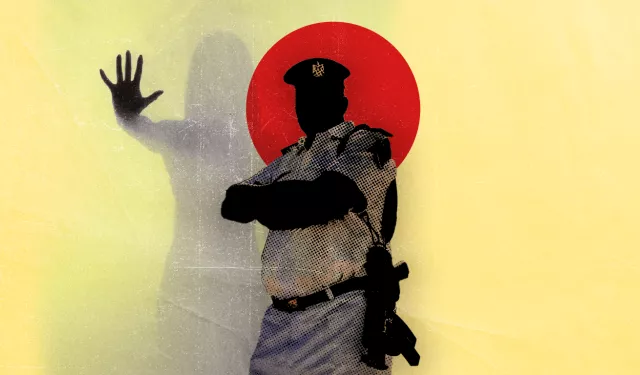
Restraining orders offer women little protection from violence
“I’m scared. I can’t go back to my apartment with my daughters.” It was as if the requests for restraining orders Hanaa Abdel Aziz(*) filed against her ex-husband and her brother never existed. She was forced to move to another city to escape their abuse, yet the threats soon resurfaced.
Four years earlier, Hanaa, a 34-year-old mother of two girls from Tanta, made the decision to separate from her husband. She sought shelter in the familiar walls of her family’s home. But that apartment belonged to her brother, who had lived there with his wife for three years. Her return was not welcome. He pressured her to reconcile with her husband. When she refused, his words turned violent. Then his hands did too, in front of her daughters.
Amidst her relatives’ blame, Hanaa turned to the police and filed two separate complaints. One against the partner she left. One against the brother she trusted. Both were met with silence dressed in bureaucracy. Neither report resulted in meaningful protection.
Hanaa’s story is not unique. It belongs to the growing archive of thousands of Egyptian women, who reach for legal protection only to discover the system’s hollow interior and society’s unforgiving culture. On paper, restraining orders promise safety. In practice, requests for an order often languish in forgotten folders while threats metastasize into beatings, into disappearances, into headlines.
A pattern of disregard
Several high-profile cases over recent years demonstrate the deadly consequences of failing to act on women’s reports. Naira Ashraf, a student at Mansoura University, was murdered in broad daylight—stabbed in front of her campus gates by a classmate she had repeatedly reported. Her appeals for protection were met with indifference from authorities. Her blood now marks the pavement where justice failed to walk.
Even the court, in sentencing her killer to death, acknowledged the failure: “Because he was rejected and requests for a restraining order were filed against him, the defendant developed a desire to take revenge on the victim and continued to make death threats against her until June 1, 2022, when he purchased a knife and made up his mind to carry out the crime.”
Manar Al-A‘sar could have been another name in the litany of neglect. For five years, she was stalked by Hesham Mahmoud Hamdoun. She filed report after report. Manar had also submitted a memorandum to the National Council for Women in July 2024 detailing years of harassment and threats. Eventually, the Beni Suef Economic Court fined her stalker 20,000 Egyptian pounds (about $400) and ordered an additional 5,000 pounds (about $100) in damages. Her story found light only after her journalist brother, Mostafa Al-A‘sar, carried it into the public sphere. Without that, the system may never have moved.
Recurring violence
According to attorney Omar Mohamed of the Haqqi rights initiative, reports of harassment are an important legal tool, “intended to document threats to personal safety or property and prompt preventive measures by police.”
But law, like tools, is only useful if it’s wielded.
Lawyer and rights advocate Entessar Elsaeed, who chairs the Cairo Foundation for Development and Law, argues that restraint requests function largely as symbolic gestures. “Sometimes they deter ordinary individuals who fear prison,” she said. “But recently, they’ve lost much of their effect.” She pointed to Hanaa, who withheld her real name to avoid further threats.
Hanaa’s reports against her brother failed to stop him. The threats escalated even after she rented a separate apartment. “He told me I couldn’t live alone with my girls. He threatened to kidnap and kill me, and said he would hire women to drag me back to the family home,” she told Al Manassa.
Lawyer Aziza El-Tawil of the Egyptian Initiative for Personal Rights urged the authorities to investigate such reports immediately. “The core issue is that complaints are minimized or dismissed until tragedy strikes,” she said, citing Naira Ashraf’s case as an example of how serious intervention might have saved a life.
The numbers echo what the courts overlook. The Sout to Support Women’s Rights initiative recorded 252 cases of violence against women and girls in the first half of 2025 alone. In 70% of those cases, the perpetrators were either husbands or close relatives.
Executive Director Noha Sayed told Al Manassa that the figures reflect the continuing high levels of violence against women in both the public and private spheres, an indication that legal deterrence is weak. She noted that “the actual numbers may be much higher due to many cases not being reported or published.”
Further evidence of the extent of violence against women came in the 2022 Egyptian Family Health Survey, published by the Central Agency for Public Mobilization and Statistics. The survey found that one in three ever-married women aged 15 to 49 had experienced spousal violence. Within families, 25% reported physical abuse, 22% psychological abuse, and 6% sexual violence.
And still the pain multiplies. The “Violence against Women and Girls Observatory Report 2023” by the Edraak Foundation counted the officially documented cases of suicides and suicide attempts by women and girls linked to family and societal violence to reach a staggering 97 and 34 respectively. The shades of violence which triggered these cases cascaded from beatings and forced marriage, to bullying and psychological pressure.
Structural limitations
Elsaeed, one of the lawyers who participated in the drafting committee for a proposed unified law to combat violence against women, explained that Egyptian law does not formally recognize requests for a restraining order. Filing depends on the discretion of individual police officers.
“Sometimes when we go to file a request for a restraining order, we face difficulty because they say, ‘You all know, that there’s no such thing as a request for a restraining order,’” she said.
Even when reports are filed, their weight hangs on whether the accused signs, she noted. And even then, “the matter depends on the judge’s discretion.” In such cases, she emphasized, without visible bruises, without a medical report, the assault might as well not have happened.
Survivors, lawyer Omar Mohamed said, are made to bleed twice. Once by their abuser, and once more by the system. Victims are often forced to recount traumatic events multiple times before their pain is even put to paper by an officer. Police typically demand witnesses, physical evidence, and certainty, none of which exist inside the four walls of the home, where most of the threats take place. This requirement leads to many reports being sealed shut without follow-up.
Mohamed also described other tactics that discourage reporting, including long waits, intimidation, and misinformation about legal procedures. Many women withdraw their complaints under such pressure. “These reports rarely result in serious investigation or monitoring,” he said.
Sometimes women don’t walk away because they’re dissuaded. Sometimes they do it willingly, painfully, to keep the family from collapsing entirely. “Mothers worry their children will resent them for imprisoning their father,” Elsaeed said, noting cases in which women sustained permanent injuries but still refused to pursue charges.
Beyond gender distinctions
While most cases involve women, El-Tawil emphasized that the law’s negligence doesn’t discriminate whether the filer is male, female, or trans. In all cases, the restraint request will likely be disregarded. In May 2023, a man was killed by neighbors in a dispute over the right to sell bread, despite having filed a report against them. Another man, in Cairo’s Hadaek Al-Qubba, was murdered in retaliation for filing a report to protect his female cousin.
Filing a report can still serve a purpose, El-Tawil said. It documents intent, especially if abuse repeats, which can increase penalties. Under Article 240 of the Penal Code, causing permanent disability carries a sentence of three to five years. With proof of premeditation, that rises to 10.
Despite this potential, Amr Mohamed characterized the reports as “just ink on paper.” Elsaeed similarly argued that systemic reform is required, including passage of a unified law criminalizing violence against women, alongside comprehensive support such as psychological counseling, safe housing, compensation, and rehabilitation.
Although the National Council for Women launched a free hotline (15115) in 2015 for reporting violence and family law issues, Elsaeed contends it remains underused and poorly publicized. Many women are unaware of it.
In the meantime, Hanaa continues to file reports. After renewed threats, she went back to the police, hoping that this time, the restraining order will protect her and allow her to return home without fear.
(*) A pseudonym at her request.


